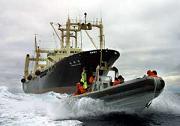Greenpeace
Japanese whalers stole meat from research hunt
 Japan's whaling crew, which hunts whales in Antarctica under a scientific permit issued by the Japanese government, stole whale meat from a ship to sell to shops and restaurants, an environmental group said today.
Japan's whaling crew, which hunts whales in Antarctica under a scientific permit issued by the Japanese government, stole whale meat from a ship to sell to shops and restaurants, an environmental group said today.
Crew members of the Nisshin Maru factory ship sent home at least 47 boxes, equivalent to a metric ton, of whale meat worth as much as 15 million yen ($140,000) after the ship returned in April, Greenpeace Japan whaling campaigner Junichi Sato said.
Japan spends as much as $60 million a year on its whaling programs and relies on official sales of meat from the Antarctic hunt to fund 85 percent of its costs. The research program faces a funding shortfall after two consecutive Antarctic hunts yielded fewer whales than planned.
“Taxpayers' money is used to fund these expeditions and it turns out whale meat is being stolen and sold for the benefit of individuals,'' Sato told reporters in Tokyo today. “The validity of scientific whaling must be reviewed again.”
Greenpeace is demanding the government end subsidies for Japan's whaling program and revoke the permit issued to the publicly funded Institute of Cetacean Research, which oversees the annual Antarctic hunts. The environmental group will deliver the full report of a four-month investigation to public prosecutors today and seek a public inquiry into the level of “corruption” within the whaling program.
Japan's Fisheries Agency is investigating the Greenpeace allegations, Chief Cabinet Secretary Nobutaka Machimura told reporters in Tokyo today.
‘Small Amount’
“We have been giving a small amount of whale meat to crew members to thank them for their efforts,” Hajime Ishikawa, deputy head of the Institute of Cetacean Research, said in an interview shown on national broadcaster NHK. “The custom is continuing, there's no legal problem.”
Greenpeace displayed a box of whale meat it said was sent by one of 12 crew members on the Nisshin Maru, the ship named in a criminal complaint the group is filing with prosecutors. The box, marked as containing “cardboard” on the delivery slip, held 23.5 kilograms of “unesu” belly meat used for salted bacon, with a market value of as much as 300,000 yen.
Crew members routinely take as much as 300 kilograms of whale meat each, Greenpeace cited one informer as saying in its investigation report. Greenpeace says it interviewed unidentified current and former employees of Kyodo Senpaku Kaisha Ltd., contracted by the Institute of Cetacean Research to conduct the hunts, during its investigation.
‘Trust’
“The government says research whaling is justified in the international community for its contribution to science, but this investigation completely undermines that assertion,” Jun Hoshikawa, head of Greenpeace Japan, said today. “This will hurt the trust of Japan in the international community.”
Japan's whaling is opposed by countries led by the U.S., European Union, New Zealand and Australia, which dispatched a customs vessel to monitor the whalers in Antarctica in preparation for possible international legal action.
Australian customs officials released photographs of what they said were a minke mother and calf being dragged onto a whaling ship, which Japan said were “emotional propaganda” that may damage ties.
Japanese Prime Minister Yasuo Fukuda told reporters today he and his Australian counterpart Kevin Rudd agreed that the whaling dispute should not damage ties between the two countries in a phone conversation earlier this morning.
Members of the International Whaling Commission, which imposed a global moratorium on commercial whaling in 1986, are allowed to issue scientific whaling permits on the condition that meat from slaughtered whales, known as research byproduct, is later consumed.
Reduced Catch
Japan killed 551 whales out of a planned catch of as many as 1,035 on the most recent Antarctic expedition, which ended in April after being disrupted by activists from the Sea Shepherd Conservation Society and Greenpeace International. A year earlier, the fleet caught 508 whales out of a planned 945 after a fire crippled the 7,440-metric ton Nisshin Maru.
Meat from the expeditions is sold in markets in Japan and also distributed for use in school lunches. Japan's whale meat stockpile stood at 2,485 tons at the end of February, down from 3,161 tons a year earlier, official statistics show.
Whale meat consumption in Japan has fallen to around 30 grams per person per year, Greenpeace's Sato said, adding that demand for the kind of premium meat sent by the crew members was “comparatively high.”
(Published by Bloomberg 15, 2008)